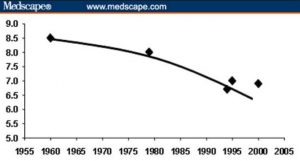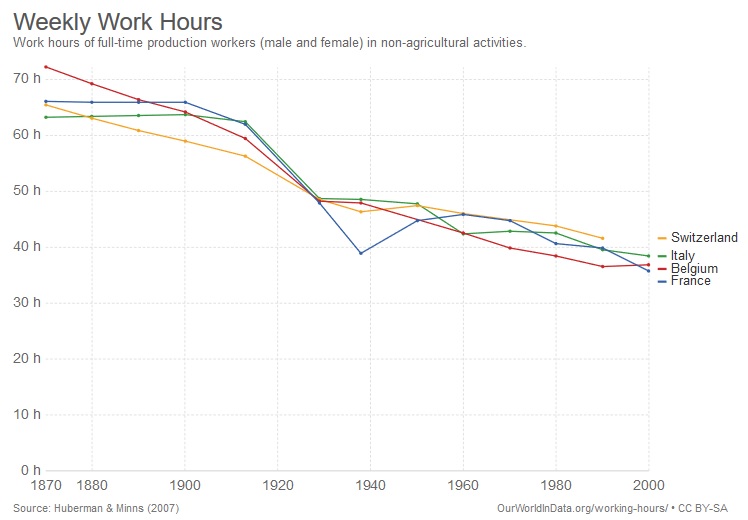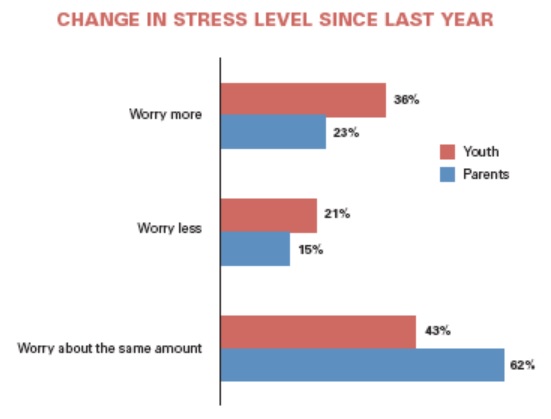It is no secret that our working lives are becoming more frantic and competitive. People in developed countries are leading lives that are more hectic and strained than ever before. It can feel like a juggling act trying to balance our own wellbeing with the tribulations of our careers, social lives, and other obligations.
We needn’t look much further than the data we have available in analyzing the overall trend. This series of graphs illustrates the way in which our lifestyles have changed over the course of just a few generations.
We are sleeping less than ever before

In many countries, we are working fewer hours than before…

…but much of our additional free time is being eaten up by screens and mobile devices

And according to the American Psychological Association, more of us are feeling stressed out

Our hyper-competitive world may be responsible for these findings. Children are pushed to breaking point by examinations that will supposedly determine the course of their future. Meanwhile, parents struggle to strike a balance between their home and work lives. In the middle of all this, we’re observing an unprecedented shift in the way we spend our free time.
The addiction to mobile devices is eating up a considerable share of our days. This is worrisome for many reasons, not least because social media has been linked to depression and anxiety, and the blue light emitted by screens has the potential to disrupt our circadian rhythms. In the process, this may cause our already limited amount of sleep to be of significantly poorer quality.
Attempting to perform to our potential in the presence of intense work and school competition has led many to seek out novel ways of gaining a mental edge. Sleeplessness and stress may also be a driving force behind the emergence of so-called smart drugs.
The smart drug revolution: friend or foe?
An article published by the BBC piqued my interest in this relatively new phenomenon. Smart drugs are distinguished from a class of substances known as nootropics in that they are typically only available from a doctor.
Nootropics have gained huge exposure and adoption over recent years, thanks in part to their ready availability. The truth is, however, we simply don’t know much about them. Bold claims are made by manufacturers of products like CILTEP, a blend of ingredients that allegedly packs a triple whammy of improved mood, concentration, and motivation.
Supplement manufacturers are able to conveniently sidestep stringent FDA regulations by selling their products as ‘dietary supplements’.
While science may be playing catchup there is a tangible sense of excitement and curiosity among users of nootropics. The extent to which these ingredients actually work is debatable, especially in light of a possible placebo effect.
Dr. Mickiewicz writes a balanced opinion piece of nootropics in which he makes a credible case for the use of proven ingredients like gingko biloba while also offering up caution regarding the more ‘radical’ racetam substances which he argues are venturing into unknown territory.
It seems that many of us are willing to take the risk in the hope of reaching a kind of mental nirvana which simply doesn’t exist on the terms that producers would have you believe. Young people are the driving force behind the boom in sales of nootropics but their motivations for buying the products differ widely.
Some are seeking to banish low mood and anxiety, others are trying to boost their ability to work and study at a sustained high level, and still more are simply determined to find the motivation to pack workouts and other activities into their seemingly limited amount of free time.
What does the evidence say?
Manufacturers are fond of packing their websites with scientific references but in many cases the studies cited are of low quality or small size. It is simply too expensive to conduct large and comprehensive research for every novel product that reaches the market as a dietary supplement.
Nevertheless, many users rave about their successes with ‘stacking’ nootropic ingredients — the process of designing a combination of substances into a daily ritual aimed at achieving specific goals. Reddit has a large community dedicated to the discussion of nootropics and maximizing potenial gains from their use.
Randomized double blind studies remain the gold standard of scientific research and more work is needed to unravel the mystery of these products. The possibility of real improvements in mental performance from their use cannot be discounted.
Another appreciable quality of the nootropic community is their commitment to minimizing harm, avoiding side effects, and nullifying addiction. What we do know is that these substances are generally safe for consumption. This could well be a driving factor behind people’s willingness to give them a try.
In all likelihood, however, the claims of manufacturers are inflated and somewhat misleading. As in many cases, the truth of the matter may lie somewhere in the expansive middle. While some supplements have shown promise in certain areas, we also still don’t know exactly which metrics of mental performance are most influenced by the use of nootropics.
Making claims of increased motivation is somewhat tenuous and hard to pin down. Mood and anxiety changes on the other hand are easier to tease out of people using diagnostic tests. We also have clear evidence that caffeine, for instance, can boost alertness in users.
The growth in this industry shows no signs of slowing down, but those of us on the side of science will continue to demand a catchup in the body of evidence before we truly get on board with the modern nootropic boom.